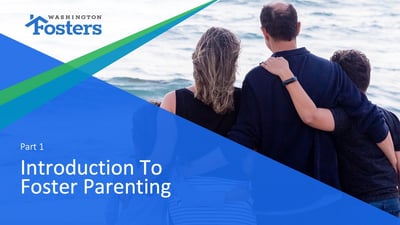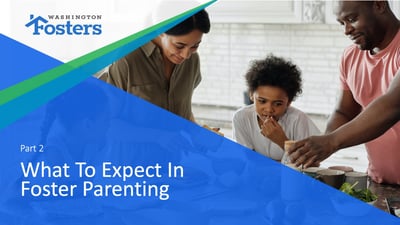As you consider becoming a foster parent, a huge part of the decision is understanding the financial commitment that you will need to make. Doing so will allow you to be more prepared to care for a foster child and to use all the resources available to you.
There are many misconceptions out there about getting paid as a foster parent. These include the idea that foster parenting is lucrative or, conversely, that it often creates a financial strain. This article is meant to help demystify these ideas so you can have a better understanding of what to expect.
Before we dive in, it’s important to note that the point of foster care is not money. It’s about providing a safe, supportive temporary home for a child (or children) until they can be reunified with their family.
Access Our FREE On-Demand Webinar Course: Foster Parenting in Washington State

With that said, let’s go through some of the most common questions that people have about foster care reimbursement.
1. Do Foster Parents Get Paid?
First things first: foster parents do not get paid. They get reimbursed. And it’s important to understand the difference. Reimbursement is money that foster parents receive on a monthly basis that covers the average cost of basic expenses.
This isn’t a paycheck, because foster parents aren’t employees — they’re volunteers. Monthly reimbursement helps cover necessities but should never be the main motivator for foster parents.
2. What Does Monthly Reimbursement Cover?
Reimbursement is intended to pay for a foster child’s basic expenses. That means it will cover the average amount needed to provide a child with food, clothing, and shelter. Reimbursement doesn’t include the cost of any non-essential expenses like activities and recreation. This means that reimbursement won’t cover:
- Vacation expenses
- Movie tickets
- Birthday party gifts and decorations
- A new bicycle and helmet
- Anything else that is non-essential
So if you choose to become a foster parent, you can rely on reimbursement to help you meet a child’s basic needs, but you should also expect to make a personal financial commitment.

3. How Much Do Foster Parents Get Reimbursed?
Foster parents are reimbursed according to the age of a child and the level of care that they need. For example, since the average cost of basic needs for older children is higher, foster parents of older children receive more reimbursement.
Reimbursement also depends on the specific needs of a child. Some children have no exceptional needs, while some have medical needs, and others have behavioral health needs. For example, the highest level of reimbursement is for Behavioral Rehabilitation Services, which requires foster parents to have additional training and a high level of skills and experience.
Placements are tailored to the needs of each foster child and the expertise level of the foster parents. Foster parents should not take a high-needs placement with the goal of receiving higher reimbursement — in fact, doing so can end up having a negative effect on both foster parents and foster children.
 4. Are There Other Resources That Can Help?
4. Are There Other Resources That Can Help?
Foster parents and children sometimes need some extra support, and there are many organizations that you can reach out to. Here are just a few:
- Treehouse provides school supplies and funding for school fees, college application fees, extracurriculars, and more.
- Foster Parent Alliance of Washington State helps connect foster parents with local support statewide.
If you choose to get licensed with the help of a private Child Placement Agency (CPA), they can help you get connected with other organizations and may directly provide you with additional resources as well.
As a potential foster parent, you need a clear picture of financial commitments and support that’s available to you. Now that you know what to expect, you’re one step closer to being ready to welcome a foster child into your home.
Thinking about becoming a foster parent? Click here to access our FREE on-demand 8-part webinar course to learn more about the importance of foster parents, the process of getting licensed, and the everyday experience of caring for a foster child.








